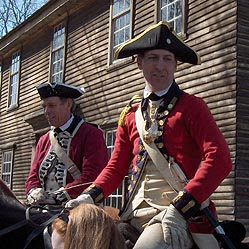 Three days after the Battle of Lexington and Concord, the Massachusetts Provincial Congress formed a committee to collect depositions of what had happened on 18-19 Apr 1775. Political activists on both sides had likewise collected such sworn testimony after the Boston Massacre in 1770 and other disputed events.
Three days after the Battle of Lexington and Concord, the Massachusetts Provincial Congress formed a committee to collect depositions of what had happened on 18-19 Apr 1775. Political activists on both sides had likewise collected such sworn testimony after the Boston Massacre in 1770 and other disputed events.Here’s the first of those depositions as they were eventually printed, written down and sworn to at Lexington on 25 April:
We, Solomon Brown, Jonathan Loring, and Elijah Sanderson, all of lawful Age, and of Lexington, in the County of Middlesex, and Collony of the Massachusett Bay, in New England, do testifie and declare, that on the evening of the Eighteenth of April, Instant [i.e., this year], being on the Road between Concord and Lexington, and all of us mounted on Horses, we were, about ten of the Clock, suddenly surprized by nine Persons, whom we took to be Regular [i.e., army] Officers, who Rode up to us, mounted and armed, each having a Pistol in His Hand, and after Putting Pistols to our Breasts, and seizing the Bridles of our Horses, they swore, that if we stirred another step, we should be all Dead Men, upon which we surrendered our selves.What an outrage against British and American liberty! Young men detained at pistol point on threat of death—their horses taken away—all by officers of a standing army!
They Detained us until Two o’Clock the next morning, in which tune they searched and greatly abused us; having first enquired about the Magazine at Concord, whether any Guards were posted there, and whether the bridges were up, and said four or five Regiments of Regulars would be in Possession of the stores soon; they then brought us back to Lexington, cut the Horses Bridles and Girts, turned them Loose, and then Left us.
SOLOMON BROWN,
JONATHAN LORING,
ELIJAH SANDERSON.
Yet somehow these three deponents have managed to leave out some details:
- Just why they were riding between Lexington and Concord at 10:00 at night.
- Anyone else who was detained by the same British officers during the next four hours—in particular, a man who’d come all the way to Lexington from Boston named Paul Revere.
- What they did after they were released from army custody.
Brown was eighteen years old in 1775, Loring twenty-six, and Sanderson probably twenty-four. They would all live into the next century, and two would eventually say more about their experiences on the first day of the Revolutionary War. I’ll be quoting more from and about them.
Interesting. It may be useful to examine whether or not there were any curfew laws on the books at the time when these men were detained. This is something you may know already, of course, but the reasons you say are left out may simply have been obvious to the readers.
ReplyDeleteOr not, of course.
No, no curfew laws for white men, and in any event those would have been up to the local authorities rather than military officers to enforce.
ReplyDeleteThere were rules against traveling from one town to another on a Sunday without a life-and-death reason, but this was in the middle of the week.